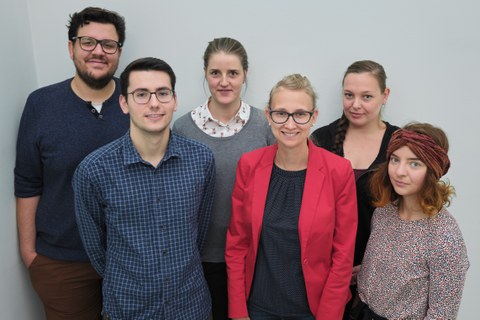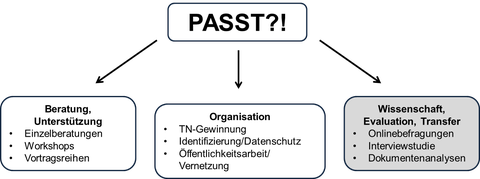PASST?! study success research as part of the PASST?! program (2016-2020)

v.l.n.r.: Paulo Emilio Isenberg Lima (SHK bis 31.12.2019; Koordinator ab 01.01.2020), Marvin Liebig (SHK bis 30.09.2020), Pauline Dunkel (WHK), Dr. Franziska Schulze-Stocker, Anne Jaschan (WHK), Lena-Sophie Raspe (SHK)
Aim
The PASST?! program, carried out in cooperation with the Central Student Advisory Service of the TUD Dresden University of Technology, was prompted by the TU Dresden's desire to develop an early warning system to increase student success and to offer students tailor-made advisory services.
Information on the PASST?! program can be found here.
Against the backdrop of the Bologna reform, the opening of universities to new target groups, the improved compatibility of studies and career or family and monitoring at universities, academic success is increasingly being addressed, not least in university development planning. The Saxon University Development Plan 2025 identifies successful graduation, a short duration of study and good (interdisciplinary) qualifications for the job market as key factors for academic success. Academic success - as well as dropping out or changing degree programs and universities - is a long-term process that is influenced by numerous aspects.
The aim of the PASST?! program is to identify problematic courses of study in good time and to offer the students concerned individual advice and support. The central tasks of the accompanying scientific research are
- Researching reasons and possible patterns in study courses that may lead to students dropping out.
- Evaluation of the PASST?! program in order to measure the success of individual measures and to transfer project results into practice at universities and university research.
In order to achieve these goals, the ZQA conducts both quantitative and qualitative surveys on the conditions for successful study progression as well as document analyses. At the same time, the research results support the Central Student Advisory Service in improving the organization and advice within the PASST?! programme.
Information on data protection in the evaluation of the PASST?! program can be found here.
Through the continuous transfer of knowledge, the quality management for studies and teaching at TUD Dresden University of Technology also benefits from this research project.

Arbeitsbereiche des PASST?!-Programms
Publications
Current scientific articles on the PASST?! program and the associated research on student success can be found here.
Duration
04/2016 until 12/2020
Project sponsor and funding program
Funded by the Saxon State Ministry of Science and the Arts with funds from the Higher Education Pact 2020 (see Study Success Strategy)
